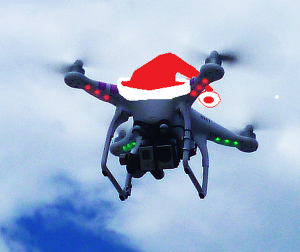The Santa Claus Drone: Fine for Your Kids, So Why Not the Office?

“He knows when you’re sleeping; he knows when you’re awake. He knows if you’ve been bad or good, so be good for goodness’ sake.“—Lyrics, “Santa Claus Is Coming to Town ” (The Temptations)
Warning children over the generations that they have been and are under constant, moment-to-moment, year-round surveillance by Santa Claus seems to have
- been perfectly fine with their parents
- done them no apparent harm when they’ve believed it
- done them even less harm when they haven’t
- reinforced positive behaviors and performance (albeit with negative threats)
- incentivized compliance and positive initiative.
Likewise with the omniscient, if not ubiquitous gods of most religions. Same idea: You’re being watched, can’t hide and better do good or better….or else! So, why not deploy office drones to hover over our desks, the water cooler, conference rooms, cafeteria and parking lot? Won’t the consequences and incentives be the same as with your kids? Or, once again, are we to foist a double standard on others that conveniently exempts us?
“But it’s different with our kids!”, you sputter. Really? Prove it. Or at least try. Maybe you think these arguments will suffice:
1. “Kids require real or imagined surveillance or the threat of it, because they are unprepared for the real world and its hazards, because their judgment is immature and because they require constant attention to and supervision during the formation of their values and performance.”
REPLY: Perhaps, but adults are more adept at concealment, subtle deception, evasion, rationalization of misconduct or lapses of effort and performance. Besides, how is an office trainee or recently promoted manager any less in a formative stage than a child?
2. “Kids have to be reminded and shown that character and sound values are intrinsically rewarding; hence the value of the injunction to ‘be good for goodness’ sake’, communicated by and backed up with the power of permanent surveillance.”
REPLY: As a justification for child or office drone surveillance, this is a conceptual and psychological muddle. In the first place, it is self-contradictory, if not hypocritical, to tell a child to be good for goodness’ sake, when it is clear that the being good is for the sake of annual Christmas performance bonuses, i.e., gifts from “Santa”.
That’s tantamount to extrinsically rewarding pretending to be motivated by intrinsic rewards for being good. Rubbish! If the message really were “be good for goodness’ sake”, permanent surveillance by Santa or drones would be neither necessary nor justifiable—much as the “or else” in “Thou shalt obey my commandments—or else!” hardly presents those commandments as intrinsically and inherently right, valuable and rewarding. Using Santa or drones to enforce performance standards in kids or workers will never instill them as intrinsically motivated values.
3. “Our kids note the surveillance only seasonally, in the run-up to Christmas. The rest of the year, they don’t think about it, even if they believe it exists. We, however, would notice it constantly and be distracted, resentful of or burdened by it, if only because the workplace surveillance drones would conduct would be relentless and obvious in-my-face, of-my-face-and-space monitoring.”
REPLY: This argument contradicts the entire premise of Santa Claus surveillance. You can’t, on the one hand, argue that the Xmas seasonal warning and exhortation to “be good for goodness sake” is important and effective throughout the year, yet, on the other hand, claim that it will be ignored the rest of the year. That is a self-“deconstructing” position, in that the defense of the claim subverts it.
If a once-a-year reminder that you are under permanent surveillance is going to be forgotten or ignored the rest of the year, the correct inference is that the song should be heard and the workplace Santa Claus drone should be hovering daily, to ensure good behavior and full compliance with company policies and the song’s exhortations (e.g., “You better not shout, you better not cry, you better not pout, I’m telling you why…”)
As for the distraction argument, namely, that the constant presence of a drone would be unnerving and distracting, think of the drone as being like a permanently switched-on smoke alarm: If there’s no fire, there will be no alarm to be heard and no need for alarm to be felt. Just as having a smoke alarm permanently above your head in no way distracts attention or compromises work performance, having a drone hovering above your desk shouldn’t either.
If you argue that drone motion in and of itself would be distracting, ask yourself this: Why isn’t the gently bobbing birthday balloon anchored to your desk a distraction?
4. “Adults internalize controls they didn’t have as kids. In psychoanalytic terms this means reality-testing ego and morality-defining super-ego involvement. So, until the internalization process is completed, forceful external controls, including in the form of real or imagined surveillance, are necessary.”
REPLY: To the extent that adults are more adept at rationalizing lack of control than kids are, such allegedly superior adult internalized control is a self-serving delusion and deception. Besides, the premise that kids have less internalized control suggests that they may persist in uncontrolled behavior even when monitored—as the average parent can attest regarding the effectiveness of his or her on-site efforts to squelch a tantrum.
Your internalized-control argument suggest only that kids need beefed up control, not that you deserve less.
Legitimization of the use of workplace drones, however initially dismaying you may deem it, does have an upside: If you, while on the job and over the course of the year, are good for goodness’ sake, you may have a very pleasant surprise at your next office Xmas party.
Your boss may reward you with a great gift…
…Your very own upgraded drone.
……………………………
Photo: Michael Moffa

